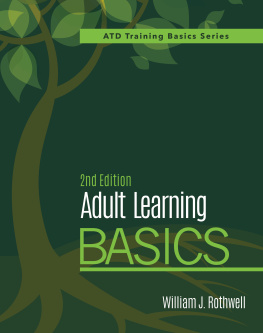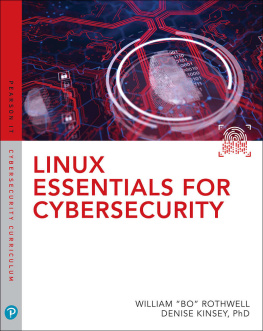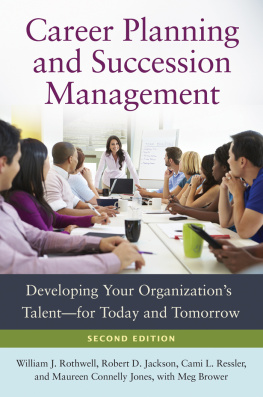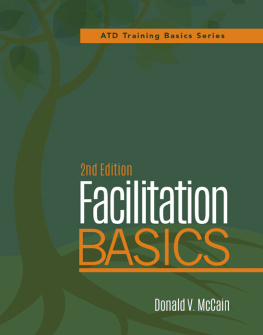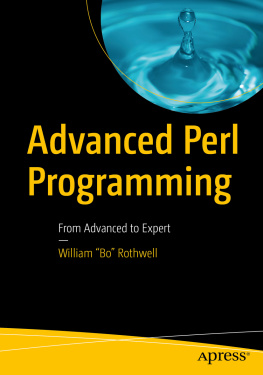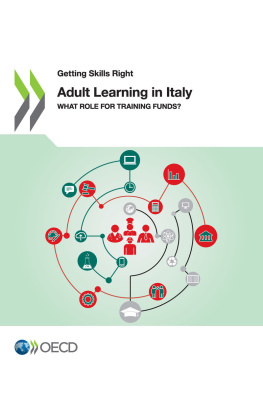William Rothwell - Adult Learning Basics
Here you can read online William Rothwell - Adult Learning Basics full text of the book (entire story) in english for free. Download pdf and epub, get meaning, cover and reviews about this ebook. year: 2020, publisher: Association for Talent Development, genre: Romance novel. Description of the work, (preface) as well as reviews are available. Best literature library LitArk.com created for fans of good reading and offers a wide selection of genres:
Romance novel
Science fiction
Adventure
Detective
Science
History
Home and family
Prose
Art
Politics
Computer
Non-fiction
Religion
Business
Children
Humor
Choose a favorite category and find really read worthwhile books. Enjoy immersion in the world of imagination, feel the emotions of the characters or learn something new for yourself, make an fascinating discovery.
- Book:Adult Learning Basics
- Author:
- Publisher:Association for Talent Development
- Genre:
- Year:2020
- Rating:5 / 5
- Favourites:Add to favourites
- Your mark:
- 100
- 1
- 2
- 3
- 4
- 5
Adult Learning Basics: summary, description and annotation
We offer to read an annotation, description, summary or preface (depends on what the author of the book "Adult Learning Basics" wrote himself). If you haven't found the necessary information about the book — write in the comments, we will try to find it.
Adult Learning Basics — read online for free the complete book (whole text) full work
Below is the text of the book, divided by pages. System saving the place of the last page read, allows you to conveniently read the book "Adult Learning Basics" online for free, without having to search again every time where you left off. Put a bookmark, and you can go to the page where you finished reading at any time.
Font size:
Interval:
Bookmark:


2020 ASTD DBA the Association for Talent Development (ATD)
All rights reserved. Printed in the United States of America.
23 22 21 20 1 2 3 4 5
No part of this publication may be reproduced, distributed, or transmitted in any form or by any means, including photocopying, recording, information storage and retrieval systems, or other electronic or mechanical methods, without the prior written permission of the publisher, except in the case of brief quotations embodied in critical reviews and certain other noncommercial uses permitted by copyright law. For permission requests, please go to www.copyright.com, or contact Copyright Clearance Center (CCC), 222 Rosewood Drive, Danvers, MA 01923 (telephone: 978.750.8400; fax: 978.646.8600).
ATD Press is an internationally renowned source of insightful and practical information on talent development, training, and professional development.
ATD Press
1640 King Street
Alexandria, VA 22314 USA
Ordering information: Books published by ATD Press can be purchased by visiting ATDs website at www.td.org/books or by calling 800.628.2783 or 703.683.8100.
Library of Congress Control Number: 2020943127
ISBN-10: 1-950496-14-7
ISBN-13: 978-1-950496-14-3
e-ISBN: 978-1-950496-15-0
ATD Press Editorial Staff
Director: Sarah Halgas
Manager: Melissa Jones
Community of Practice Manager, Learning Design: Eliza Blanchard
Production Editor: Hannah Sternberg
Text and Cover Design: Shirley E.M. Raybuck
P.A. Hutchinson, Mayfield, PA
ATDs Training Basics series recognizes and, in some ways, celebrates the fast-paced, ever-changing reality of organizations today. Jobs, roles, and expectations change quickly. One day you might be a network administrator or a process line manager, and the next day you might be asked to train 50 employees in basic computer skills or to instruct line workers in quality processes.
Where do you turn for help? The Training Basics series is designed to be your one-stop solution. The series takes a minimalist approach to your learning curve dilemma and presents only the information you need to be successful. Each book in the series guides you through key aspects of training: giving presentations, making the transition to the role of trainer, designing and delivering training, and evaluating training. The books in the series also include some advanced skills, such as performance and basic business proficiencies. The Training Basics series is the perfect tool for training and performance professionals looking for easy-to-understand materials that will prepare nontrainers to take on a training role.
In addition, this series is the consummate reference tool for any trainers bookshelf and a quick way to hone your existing skills.
All people learn in pretty much the same way, right? Wrong! Research, theory, practice, and philosophy over many years indicate that people may learn in different ways and may even change how they learn. Children tend to be willing to listen as adults give them information that may not have immediate application. But adults have traditionally been regarded as being much less patient and much more prone to focus on immediate application. They want to know why new information is worth knowing and how to use it.
Since many talent developers and other learning professionals are promoted to their roles internally, they may lack a solid grounding in adult learning theory, practice, and principles. That can cause problems. There is more to training others than simply throwing grab bags of facts at them. Good talent developers should possess an excellent grasp of how adults learn, how adult learning differs from that of children, and how older adult learning may differ from younger adult learning (Moseley and Dessinger 2006). It is also crucial to know how learning differs from training. That is especially important at a time when growing research sheds light on how brain anatomy and chemistry affect learning.
But what is an adult, and what is an adult learner? Who should read this book? This preface answers these questions, provides chapter-by-chapter highlights to indicate the issues treated in each chapter, provides an overview of visual icons that are used throughout the book to emphasize key points, and acknowledges the contributions of others to this book.
What Is an Adult, and What Is an Adult Learner?
Any book about adult learning should start off with answers to the questions What is an adult? and What is an adult learner?
The term adult usually means someone who has reached maturity. Of course, there can be a difference between mental maturity and legal age. We sometimes hear people say, Act your age to admonish someone to behave in a more mature manner. Legal age varies by culture and even by location. The key issue in legal age is the age at which an individual may enter into a contract. That is not the same everywhere in the worldor even in every locale in the United States.
An adult learner, on the other hand, usually implies someone who engages in learning beyond the traditional age of school attendance. Of course, even what is regarded as traditional school age can vary. It has been getting older as the U.S. population ages and there are fewer traditional school-age people (from ages seven to 17 for grade school and ages 17 to 21 for college). Average school age has been on the increase in the United States as people find that a plethora of college graduates leads to a need for higher educational levels to be competitive in the entry-level job market. That will be especially important after year 2025 when a precipitous drop is predicted in the graduation of high school students in the United States due to the so-called advent of the birth dearth (Grawe 2018).
But there are several important fallacies to address right at the outset of any book on adult learning. First, while adults may share some things in common, it is a mistake to generalize that all adult learners are the same. They are not. Second, while it is popular to point out generational differences in working and learning styles, the reality is that too little empirical research has been done to indicate documented and verified differences among so-called Gen X, Gen Y, Gen Z, and all the other various age groups in todays labor market (AMA 2019). Care must be taken in making sweeping generalizations about people, since the research to support it is not strong enough to do so with certainty. Third, as the U.S. and global working populations age, interest will increasingly shift from a focus on differences between teaching children and adults to differences among teaching children, adults, and older adults. An older adult is an individual beyond traditional retirement age. Some authorities even distinguish among the young old (6575), the old (7685), and the old old (86 and up).
Who Should Read This Book?
This book is written for anyone who has occasion to teach, train, coach, sponsor, or mentor adults or to facilitate groups of adults working together. The audience for this group thus may include:
Subject matter experts
Managers
Learning and talent development professionals
HR professionals
It is important to emphasize that most learning occurs on the job. Hence, supervisors, managers, and executives have important daily roles to play in developing their staff on the job (Rothwell, Chee, and Ooi 2015). Being aware of adult learning theory and practice can improve efforts to manage and develop staff members in real time while simultaneously getting the daily work accomplished.
Font size:
Interval:
Bookmark:
Similar books «Adult Learning Basics»
Look at similar books to Adult Learning Basics. We have selected literature similar in name and meaning in the hope of providing readers with more options to find new, interesting, not yet read works.
Discussion, reviews of the book Adult Learning Basics and just readers' own opinions. Leave your comments, write what you think about the work, its meaning or the main characters. Specify what exactly you liked and what you didn't like, and why you think so.

